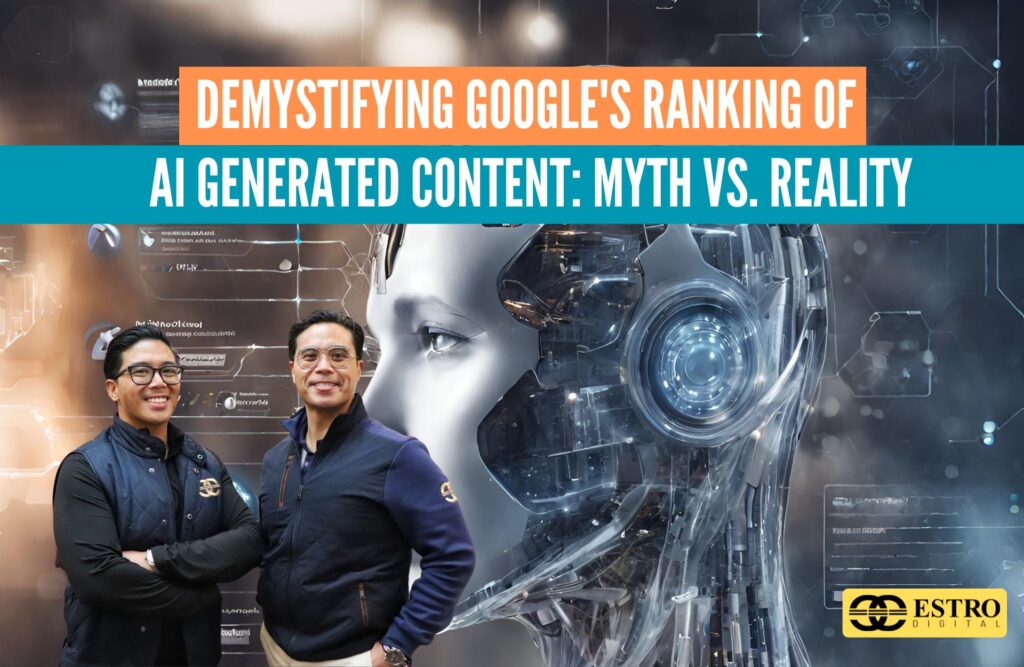In today’s digital landscape, the integration of AI technology has sparked intriguing debates surrounding its impact on search engine optimization (SEO) and Google’s ranking algorithms. Among the myriad questions swirling in the minds of content creators, one stands out prominently: Can AI-generated content truly rank on Google? In this comprehensive exploration, we’ll delve into common myths, address frequently asked questions (FAQs), and illuminate the nuanced dynamics of AI-generated content in the context of Google’s search ecosystem.
Understanding Google’s Approach to AI Content:
Google’s overarching objective remains unchanged: to deliver high-quality, relevant content that meets users’ search queries and intents. While Google’s algorithms don’t explicitly target AI-generated content for penalties, they meticulously assess all content, regardless of its origin, based on stringent criteria encompassing quality, relevance, and value to users. Therefore, the crucial aspect lies in deciphering how AI-generated content aligns with Google’s multifaceted ranking parameters.
Quality Over Method of Creation:
“But can AI-generated content truly compete in Google’s rankings?” Central to Google’s evaluation process is a steadfast prioritization of content quality over its method of creation. Whether content is crafted by human hands or AI algorithms, Google’s algorithms scrutinize it meticulously, gauging factors such as accuracy, readability, and overall utility. Thus, AI-generated content doesn’t inherently face penalization from Google, provided it meets these fundamental quality benchmarks.
The Role of Natural Language Processing (NLP):
At the heart of Google’s ranking algorithms lies the sophisticated realm of Natural Language Processing (NLP). “How does Google assess the language fluency of AI-generated content?” Leveraging cutting-edge NLP techniques, Google’s algorithms endeavor to comprehend and assess content comprehensively, irrespective of its origin. Therefore, AI-generated content that exhibits natural language fluency, coherence, and relevance to users’ search queries stands poised to fare favorably in Google’s ranking hierarchy. Content creators can optimize AI-generated content by refining NLP models and strategically integrating relevant keywords to enhance its visibility and resonance with target audiences.
Evolving SEO Strategies for AI Content:
As AI technology continues its inexorable march forward, so too must SEO strategies adapt to accommodate the nuances of AI-generated content. Staying ahead of the curve demands a proactive approach, characterized by experimentation with diverse AI models, astute comprehension of user search intent, and the artful crafting of content tailored to address specific queries effectively. Furthermore, vigilant monitoring and analysis of Google’s search results furnish invaluable insights into the performance dynamics of AI-generated content across various niches, enabling content creators to refine their strategies iteratively.
Tips for Creating High-Quality AI Content:
- Understanding Your Audience: “How can AI-generated content resonate authentically with target audiences?” Deep-dive research into the interests, preferences, and pain points of your target audience lays the groundwork for crafting content that resonates authentically.
- Fine-Tuning AI Models: Continuous refinement of AI models is imperative to elevate content quality, coherence, and relevance, thereby enhancing its efficacy in capturing and retaining audience attention.
- Incorporating Human Touch: “Can AI-generated content benefit from a human touch?” Infusing AI-generated content with a dash of human creativity, personality, and authenticity fosters deeper engagement and cultivates a sense of rapport with your audience.
- Optimizing for SEO: Rigorous keyword research coupled with strategic optimization ensures that AI-generated content aligns seamlessly with users’ search queries while maintaining the natural cadence of language.
- Monitoring Performance: “How can content creators track the success of AI-generated content?” Ongoing monitoring and analysis of AI-generated content’s performance on Google’s Search Engine Results Pages (SERPs) furnish actionable insights, empowering content creators to fine-tune their strategies for optimal outcomes.
Conclusion:
In summation, Google’s evaluation of content transcends the dichotomy of human-authored versus AI-generated, instead focusing steadfastly on quality, relevance, and utility to users. Content creators wielding AI technology possess a potent toolset for crafting compelling content that resonates authentically with audiences while aligning seamlessly with Google’s ranking parameters. By embracing the innovative potential of AI and continually refining SEO strategies, content creators can navigate the ever-evolving landscape of digital content creation with confidence and efficacy.

